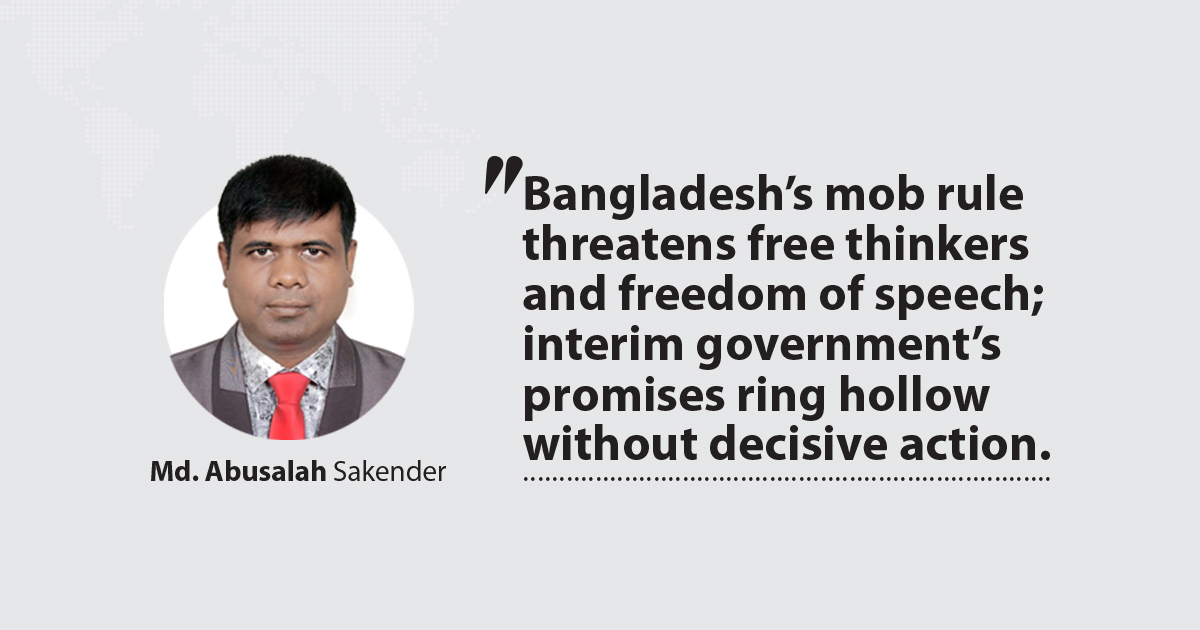

By Md. Abusalah Sakender:
The July uprising in Bangladesh changed the entire scenario of the country, but most common people are not happy due to mob rule.
The mob is dominating across the country, and the rule of law has not been restored by the interim government, which was lost during the uprising.
Intellectuals, writers, and journalists are facing continuous threats from the mob, putting free thinking and freedom of speech in danger under the post-revolutionary interim government.
During the ousted Hasina government, freedom of speech was already a contentious issue, but in the post-uprising period, it has become even more precarious.
However, the interim government claims that it is not interfering with media houses and has strictly prohibited intelligence agencies from interrupting media organizations in their news publications.
The press wing of the Chief Advisor also asserts that media and journalists are free to express their opinions and publish news.
As a writer, I see a different scenario on the ground. The mob attacked me on my university campus, and the university authorities could not take any action against the mob; unfortunately, they took action against me, following the mob’s demands regarding my write-up without giving me a chance to explain my work.
As a university teacher, freedom of expression is my official right; therefore, I am not obligated to explain my writing to the university authorities or anyone else.
An autocratic regime undermines the right to freedom of speech, which I realized after these incidents.
I had expected that we would enjoy more freedom under the rule of a well-known Nobel laureate, Dr. Younus, when he took the oath as the head of state, namely the Chief Advisor, but my hopes have been shattered by the mob recently.
During the July uprising, the government controlled the media. For instance, intelligence agencies halted the telecast of Jamuna Television, while supporters of the uprisings assaulted journalists on the ground.
Photojournalists and reporters were also killed while on duty during the July uprising.
On the last day of the uprising, August 5, 2024, the ousted Prime Minister Sheikh Hasina had to flee to India aboard a transport aircraft from the Bangladesh Air Force.
The uprisers not only looted her residence, Gonobhaban, but also targeted several media houses across the capital, Dhaka.
For example, ATN News, the Daily Amader Orthoneeti, and Somoy TV lost their broadcasting and publication equipment.
The scenes of looting were so devastating that you can understand from this note that the uprisers not only stole broadcasting equipment but also took basic items like toilet cleaners from the media houses, as I learned from a journalist working that day at ATN News.
However, in the post-revolution era, the government has ensured security for major media houses, such as Prothom Alo and Daily Star.
When an extremist Islamist leader threatened to attack these outlets, the government deployed security agencies, including the military, to ensure their safety.
Nevertheless, media houses and journalists continue to operate under fear in Bangladesh today.
Since 2019, I have been writing post-editorials for one of the leading news portals, Bangla Tribune.com.
Recently, they informed me that they would no longer publish hard-hitting articles; if I wanted to continue contributing, I would need to write softer pieces. Their message was clear.
I have often written about political issues and criticized the government freely, but now I must change my writing style and focus on non-political subjects.
I understand why the news portal changed its editorial strategy regarding the publication of post-editorials, commentaries, and analyses.
They faced several threats from extremists during the uprising period. To avoid attacks from violent mobs, not only must Bangla Tribune rethink its editorial policies to ensure the safety and security of its staff, but other media houses must also adopt similar measures.
I have had a similar experience with another widely circulated newspaper in Bangladesh, Bangladesh Pratidin.
I wrote about political issues focused on mob violence and freedom of expression, but the editorial team refused to publish my piece due to fear.
After the July uprising, they experienced a mob attack. As a result, I sent my write-up to an outlet outside Bangladesh, and it was recently published by an Indian Bengali daily newspaper, Daily Syandan Patrika.
These scenarios illustrate that mobs are dominating Bangladesh and threatening free thinkers; thus, the freedom of speech is in grave jeopardy.
The interim government claims to believe in freedom of speech and free thinking, which is encouraging, but unless they stop the mob violence and ensure the safety and security of media houses, journalists, writers, intellectuals, and free thinkers, their claims will ring hollow.
The ousted government will have the opportunity to mock their assertions.
(Md. Abusalah Sakender is an Assistant Professor in the Department of Islamic History & Culture at Jagannath University, Dhaka, Bangladesh. He can be reached at salah.sakender@outlook.com)